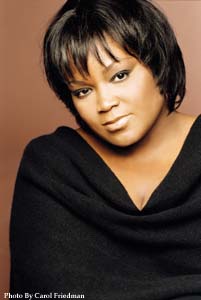Sounds Like An Angel

“There hasn’t been a lot of growing in the blues. I don’t see any reason why it cannot grow. So many blues artists were innovative. Muddy Waters, he plugged in.” Shemekia Copeland
Never Going Back (Telarc) reflects the ongoing evolution in the life and music of contemporary soulful blues diva Shemekia Copeland. Produced by guitarist/songwriter Oliver Wood (The Wood Brothers), Never Going Back brings the blues into now.
Mindful of her pedigree as the daughter of the late, legendary Texas bluesman Johnny Copeland, Shemekia’s music is organic. Not content to rehash the genre, she channels her blues roots to explore contemporary themes. She chose Wood after being introduced to him by her manager, songwriter John Hahn. “When me and Oliver got together for the first time, it was magic,” Copeland says. “We basically just talked about personal stuff . . . we made a connection right away. It is easier for me to make records with people who I have a spiritual connection with.”
Never Going Back is also Copeland’s most personal album to date (she previously recorded four records for Alligator: The Soul Truth, Talking To Strangers, Wicked, and Turn The Heat Up). “This album is different,” Copeland says. “In the past I didn’t talk about politics and religion. I purposely stayed away from it. People don’t want to hear all that negative stuff. They want to be entertained. But these days it is impossible not to talk about it.”
A recent trip to Iraq, as part of a 12-day Bluzapalooza tour, created even more urgency for the singer. Deeply moved by what she saw, Copeland felt the need to open up: “For the first time I’m trying to get people to look into my soul,” she admits.
Copeland gets right to it on the opening track, “Sounds Like The Devil,” co-written with Hahn. Wood’s swampy slide guitar sets the tone in a song that takes lying politicians and phony televangelists to task. “Love is tumblin’, dreams are crumblin’/We all looking for a place to hide/People are hurtin’, politicians certain, they got God on their side/And they’re sayin’ that he is talkin’ to ’em personally/But it sounds like the devil to me . . . Preacher told me the number’s toll free, God’s ready to wash away all my sins/I know what he’s sayin’, yeah he’s just prayin’ I’ll send all my dollars in/Lord forgive my suspicious personality, but it sounds like the devil to me.”
Copeland sings about social concerns again on the insightful “Broken World,” written by Hahn and Wood. Featuring John Medeski (Medeski Martin And Wood) on Hammond B3, the song has a catchy gospel feel, much like the best of The Staple Singers. “Broken World” is also personal for Copeland. In her wish to revolutionize the blues, she initially felt she could make an immediate impact. “For the longest time I was disappointed in myself, because I felt I hadn’t changed anything. I felt as though I was going to come out and change the world.” She came to realize she “wasn’t driving the bus,” but that she could “fix a small part of this broken world” creatively through her music.
In Wood, Copeland found a producer who captured the essence of what she’s all about. Taking her out of the “blues mama” box Alligator sought to put her in, he recognized her limitless vocal ability and willingness to expand her repertoire. He chose varied songs such as the gritty rocker “Dirty Water” by roots duo Buddy And Julie Miller and the jazzy, lilting “Black Crow” by Joni Mitchell. Copeland was initially intimidated about recording the Mitchell song, but she liked Wood’s arrangement and happily accepted the challenge.
Wood and Hahn co-wrote “Never Going Back To Memphis,” a brooding, Otis Taylor-inspired number with a rumba beat about a woman involved with a violent man, and “Born A Penny,” an autobiographical tune in which she takes a swipe at the “queen of the blues” throne, singing, “So hold that tiara, ’cause I don’t need to be queen/locked up in some castle, never was my dream/The fairy tale you wrote, wasn’t all that fair.”
Songs of female empowerment like the super-funky and menacing “Limousine” and the bluesy “Rise Up” brush against gospel tunes like “The Truth Is The Light” and the tongue-in-cheek “Big Brand New Religion.” Copeland gets bluesy with Percy Mayfield’s life-and-death battle with nature in “The River’s Invitation” and a heartfelt, acoustic version of her father’s “Circumstances.”
During our brief interview, Copeland speaks passionately about current social and political issues. Accustomed to keeping her opinions “close,” she explodes in indignation at the current financial crisis, brought on by selfish business types and politicians. “Why are people so greedy? I don’t have a million dollars to give away to charity, but I do my small part. I do look out for my family.” With President Obama in the White House, she is impelled to get involved in politics. “I’m at the age when I’m getting into politics. I was too young to vote for Clinton, and not interested in Bush. Now I feel the need. It is urgent. It means something to me now.”
She is equally passionate about the state of the music business. When asked if she was looking for crossover success, she says “Listen to the great genres of music. There shouldn’t have to be crossover to anything. If the music is good, they should play it.”
Copeland plays March 13th at the Old Town School Of Folk in Chicago.
– Beverly Zeldin-Palmer
Category: Columns, Monthly, Sweet Home











